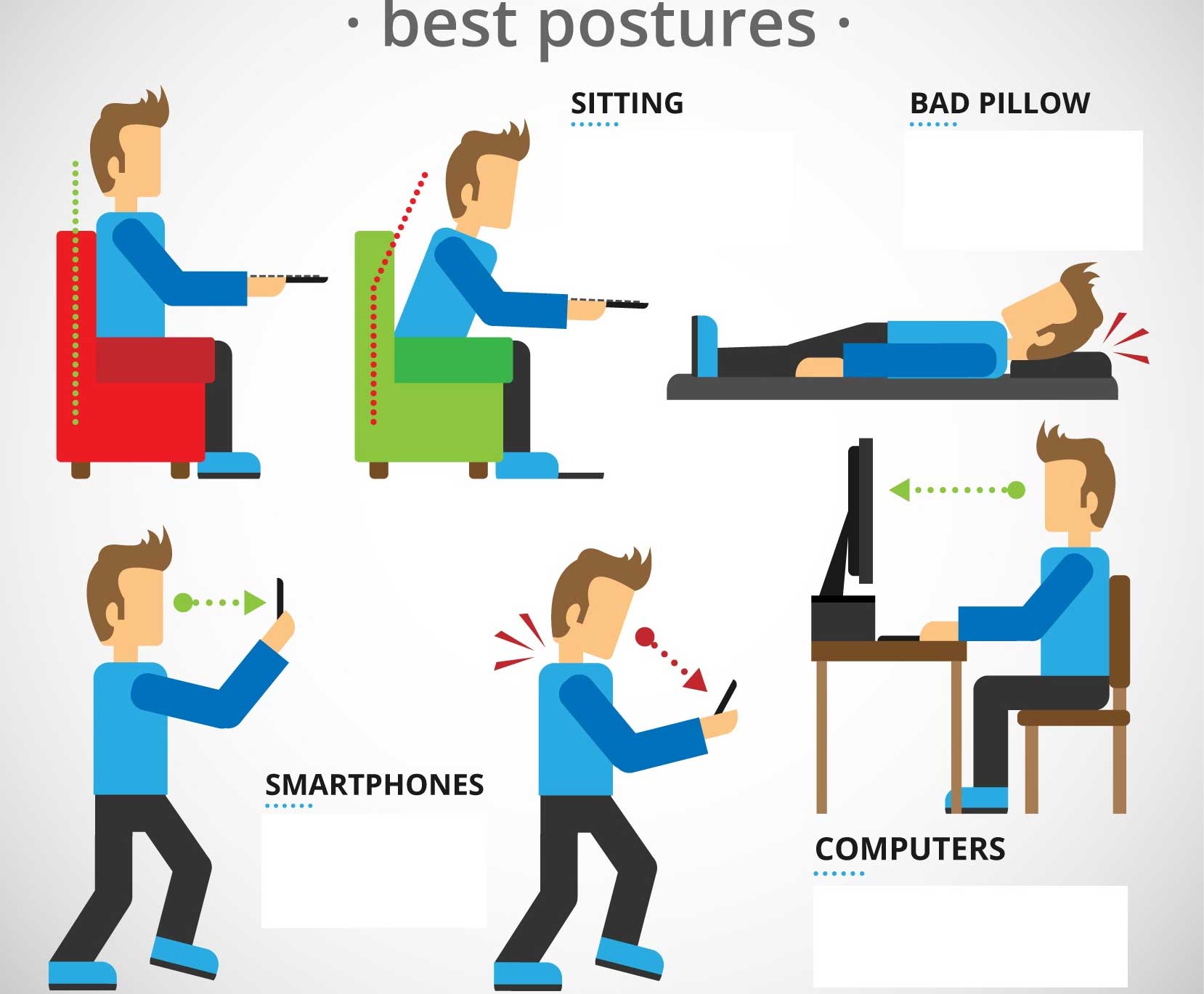Musculoskeletal disorders or MSD are the injuries or disorders associated with the muscles, nerves, tendons, joints, cartilage, and spinal discs. Musculoskeletal conditions include more than 150 conditions affecting your locomotors system. They might arise suddenly and are short-lived like fractures, sprains, and strains. They can become lifelong conditions associated with ongoing functioning limitations and disability.
Musculoskeletal conditions are often characterized by persistent pain and limitations in mobility, dexterity, and overall level of functioning, reducing your ability to work.
MSD is defined as a musculoskeletal system and connective tissue disease. The disorder is a result of the event or exposure leading to bodily reactions such as bending, climbing, crawling, reaching, twisting, overexertion, or repetitive motion. MSD is different from the disorders caused by slips, trips, falls, or similar incidents.
MSD can affect various organs of the body including:
- Joints – osteoarthritis, psoriatic arthritis, gout, rheumatoid arthritis, ankylosing spondylitis.
- Spine – back and neck pain.
- Muscles – sarcopenia.
- Bones – osteoporosis, fragility fractures, traumatic fractures.
- Multiple systems in the body – connective tissue diseases and vasculitis lead to musculoskeletal manifestations, such as systemic lupus erythematosus.
Musculoskeletal disorders are linked with high costs to employers including absenteeism, lost productivity, and increased health care, disability, and worker’s compensation costs. Musculoskeletal disorders are common and the risk of developing them increases with age.
Musculoskeletal cases sometimes are more severe than the average nonfatal injury or illness. In certain cases, MSD causes pain and discomfort interfering with your everyday activities. Early diagnosis is the key to treatment, which may help ease symptoms and improve the long-term outlook.

CAUSE OF MUSCULOSKELETAL DISORDER
The main cause of MSDs is due to your exposure to risk factors where fatigue outruns the body’s recovery system. You would often develop musculoskeletal imbalance and eventually, a disorder advances.
Musculoskeletal disorders develop gradually due to repeated trauma or injury to muscles, tendons, or nerves.
- Muscle Injury or trauma: Muscle contraction uses chemical energy from sugars and produces by-products such as lactic acid, which is removed by blood. Muscle contraction lasting for a long duration interrupts the blood flow. Thus, these substances are not removed causing accumulation in the muscles leading to muscle irritation and pain.
- Tendon Injury or trauma: Tendons are made up of various bundles of fibers that act as bridges between muscle and bone. The inner cells of the tendon wall produce a slippery fluid to keep it lubricated. Excessive movement disrupts the lubrication system. Malfunctioning of the lubricating system creates friction between the tendon and its inner wall leading to inflammation and swelling of the tendon area.
- Nerve injury or trauma: Nerves are key to carry signals from the brain to control activities of muscles. These are surrounded by muscles, tendons, and ligaments. Due to repetitive motions and awkward postures, the tissues surrounding nerves become swollen and squeeze or compress nerves leading to inflammation.

RISK FACTORS FOR MUSCULOSKELETAL DISORDERS
Factors increasing the risk of developing musculoskeletal disorders include:
- Ergonomic: The workplace design plays a crucial role in the development of MSD. You might work beyond your body’s limitations and capabilities and thereby risking the musculoskeletal system. A musculoskeletal disorder is forthcoming due to ergonomic risk factors such as high task repetition, forceful exertions, and awkward postures.
- Repetition of Tasks: Certain tasks can be highly repetitive such as daily and hourly production targets and work processes, tasks, and work cycles. These repetitive tasks when combined with other risk factors and awkward postures like high force activities can contribute to the initiation of MSD.
- Exertion of force: Certain work tasks require high levels of muscle response leading to force loads in your body. This greatly increases fatigue causing musculoskeletal disorder.
- Postures: Awkward postures can be harmful as they impose excessive force on the joints and tend to overload the muscles and tendons. Joint efficiency is dependent mainly upon its closest mid-range motion. The risk of musculoskeletal disorders increases when the joints are worked outside the mid-range repetitively without providing them adequate recovery time. If you are exposed to such forceful exertions, repetitive tasks, and prolonged awkward postures, you may experience fatigue, and your body is beyond its ability to recover. The musculoskeletal imbalance might result in MSD.
- Work Practices: Risk factors of MSD are due to poor work practices including body mechanics or lifting techniques that cause unwanted stress and fatigue. Eventually, the body loses its ability to recover completely. Excessive drinking, smoking, and poor overall health habits can put you at risk of multiple chronic diseases such as musculoskeletal disorders.
- Rest & Recovery: When fatigue outruns the body’s recovery system, then MSD develops causing musculoskeletal irregularities. Not paying much attention to the rest and recovery puts you at a higher risk of developing MSD. Poor fitness, lack of hydration, and improper nutrition routines also lead to chronic health issues as well as MSD.
SYMPTOMS OF MUSCULOSKELETAL DISORDER
The symptoms of the musculoskeletal disorder may vary depending on its cause. Common symptoms of MSD include:
- Recurrent pain.
- Stiff joints.
- Swelling.
- Dull aches.
- Aching and stiffness.
- Burning sensations in the muscles.
- Fatigue.
- Muscle twitches.
- Pain that worsens with movement.
- Sleep disturbances.
DIAGNOSIS OF MUSCULOSKELETAL DISORDER
The doctor would suggest the treatment options on basis of the cause diagnosed for musculoskeletal disorder. The doctor would perform a physical examination of the affected area before suggesting any tests. They would check for pain, redness, swelling, muscle weakness, and muscle atrophy. They would also check for reflexes as unusual reflexes indicate nerve damage.
They would recommend various tests including imaging tests, such as X-rays or MRI scans. These tests re helpful in examining your bones and soft tissues. Sometimes, blood tests are done to check for rheumatic diseases, such as rheumatoid arthritis.
TREATMENT FOR MUSCULOSKELETAL DISORDER
A treatment plan would be based on the cause of MSD and the severity of your symptoms.
The doctor may suggest moderate exercise and over-the-counter medications like ibuprofen or acetaminophen to address occasional pain. In case of severe symptoms, medications are prescribed to reduce inflammation and pain. Sometimes, doctor may suggest physical therapy or occupational therapy for relief. These therapies are helpful to manage your pain and discomfort, maintain your strength and range of motion, and adjust your everyday activities and environments.
Other treatment methods that are helpful include:
- Acupuncture
- Chiropractic adjustment
- Splints
- Steroid injections
- Therapeutic massage
TAKEAWAY
Musculoskeletal conditions or disorders can affect people of any age ranging from adolescence to old age. The risk factors of musculoskeletal disorders are common such as lack of physical activity, obesity, poor nutrition, and smoking. The management of musculoskeletal disorders requires specialist care and, surgical intervention in severe cases.
If you or anyone you know is suffering from musculoskeletal pain, our expert providers at Zenith Injury Relief & Wellness Clinic will take care of your health and help you recover.
Call us on 972-210-0033 to book an appointment with our specialists, and begin living your life pain-free.


